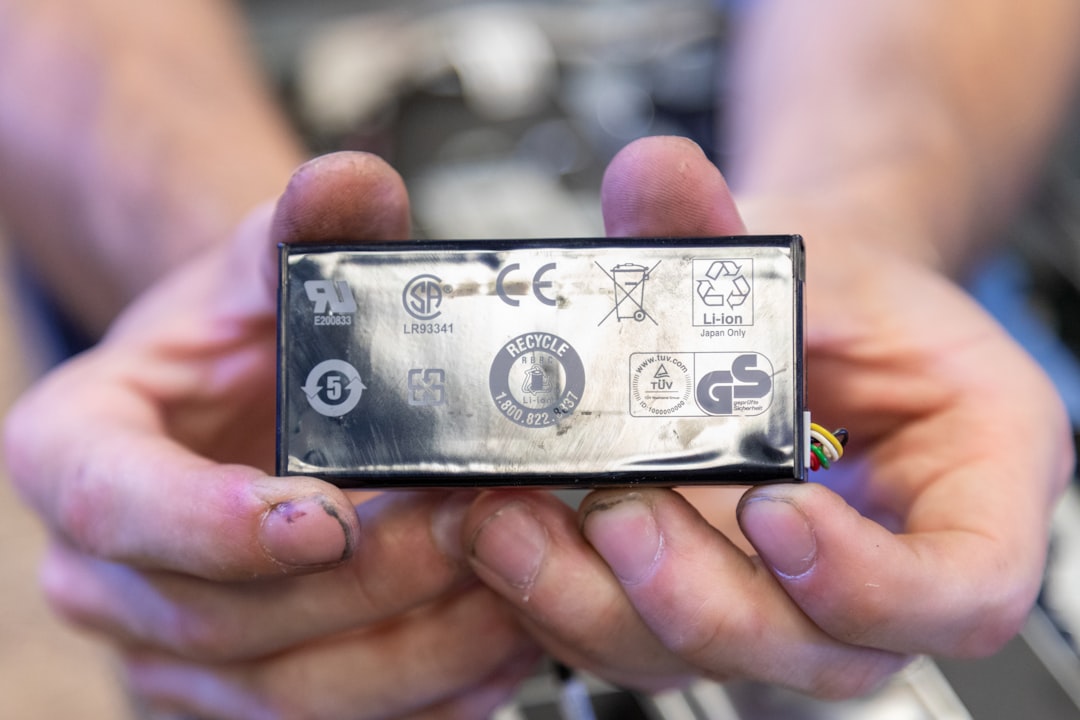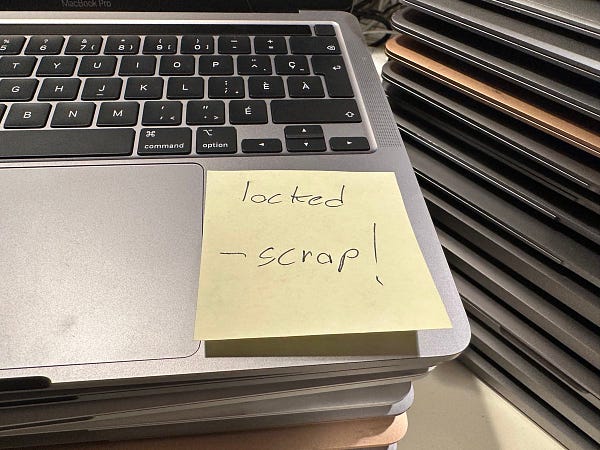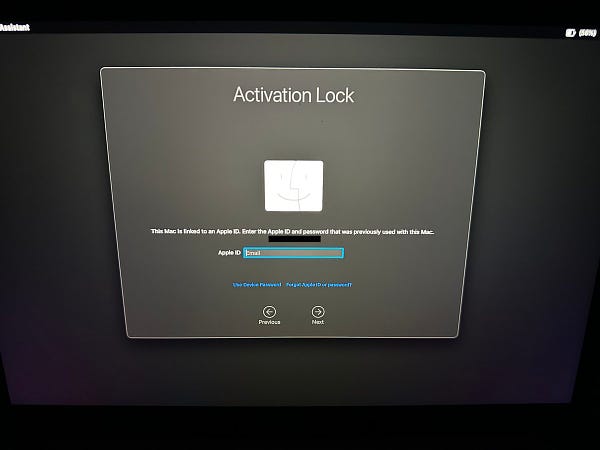With eye on sustainability, EU agrees to new battery regulations - Week in Repair
The EU's new battery regulations affect the entire life-cycle of electronics, which could transform electronics forever. Also: Samsung asks ITC to declare replacement screens illegal.
EU set to overhaul battery rules on entire lifecycle of devices
The European Union reached an agreement to overhaul the rules on batteries and take into account technological developments and future challenges. Covering the entire battery lifecycle (and applying to all battery types), the agreement spans from the design stage through end-of-life.
As we put batteries in more products from consumer electronics to vehicles, battery regulations are crucial for slowing the emissions and extending device life spans. The new rules attempt to account for the true costs of battery production, including emissions from the extraction and processing of raw materials, the manufacturing of the battery, the transportation of the finished product, and the disposal or recycling of the battery at the end of its life.
First, the agreement stipulates that batteries will be easier to remove and replace, with the goal of making devices more sustainable and durable and moving away from “disposable tech” that is only good for the life of the (non-replaceable) battery it ships with. (Hello, Apple AirPods!)
There is also an effort to educate consumers about sustainability. Under the new guidelines, a “carbon footprint declaration” and label will be required for EV batteries and lightweight means of transportation (LMT) batteries on products like e-bikes and scooters. These labeling rules have been seen in other forms, such as the French repair index.

To better inform consumers, batteries will carry labels and QR codes with information related to their capacity, performance, durability, chemical composition, as well as the “separate collection” symbol. LMT batteries as well as some industrial batteries will also be required to have a “digital battery passport” including information on the battery model as well as information specific to the individual battery and its use.
Another significant aspect of the agreement is that large companies will be required to develop and implement a “due diligence policy” to address the social and environmental risks associated with the production, consumption, and disposal of batteries. These policies will include sourcing, processing and trading raw materials and secondary raw materials. There will also be minimum levels of recovered cobalt (16%), lead (85%), lithium (6%) and nickel (6%) from manufacturing and consumer waste that must be reused in new batteries.
By having legally binding legislation that holds companies accountable, the negative impacts that battery consumption has will ideally be reduced. Additionally, by enacting labeling rules spotlighting the environmental impact of batteries in products, the rule will empower consumers with information that has previously been hidden from them.
Critiques on scope and urgency of rule
While there is praise for the rule, Right to Repair Europe had criticism on the much needed urgency on implementation:
“The entry into force for battery removability requirements will be 42 months after the entry into force of the whole directive. This means no sooner than mid-2026 or potentially even 2027 – technically in 4 years from now! Plus, this will of course only apply to new models put on the market by then, so it won’t impact any product we already own. It’s a shame as in previous drafts, the delay was 24 months, a year and a half less.”
It will also take until December of 2030 for the Commission to decide whether to phase out general-use non-rechargeable batteries. A year that some see as too-late for implementation, given key tipping points for climate change.

R2R Europe also critiqued carve-outs in the rule for products that operate in wet conditions, from e-bikes to toothbrushes. Once again, arguments over safety are driving these changes to make the rules cover a narrower set of products – arguing that swappable batteries will be unsafe in wet conditions.
While imperfect in its scope and urgency, the rule is moving electronics to a more modular model with longer life-cycles. As we have seen with other decisions from the Union on regulations such as standardizing the USB-C port, there will ideally be spillover outside of Europe as corporations begin to work within the confines of this new rule.
Other News
Samsung makes Galaxy self-repair kits available: Last year, Samsung became one of the first Android OEMs to offer a self-repair solution to its customers with kits of first-party parts and tools for its Galaxy S21 and S20 series phones in addition to the Tab S7+. Now the tech giant announced that it will expand the program to include much more recent devices, in an apparent vote of confidence in its DIY refurbishment initiative.
FTC tries to ban non-compete agreements: The Federal Trade Commission has proposed a rule to ban non-compete agreements, which keep workers from leaving their jobs to move to another competitor. Without non-compete agreements, mechanics and other repair-workers would be free to move between employers and take their skills and experience with them, which would increase competition among employers and potentially lead to higher wages and better working conditions for mechanics.
Repair and reuse better than shiny new tech: A new report suggests that reducing global material use through circular solutions, such as reuse, repair and recycling of items, can limit global warming to 2 degrees. As much as media focuses on new “green” technology coming to save us from impending doom – the answer to our problems might be less about tech and more about repair and reuse.
Copyright lawsuit from AI generated art: A company using AI art is being sued for alleged violations of the Digital Millennium Copyright Act (DMCA) – the same law that allows for digital software locks to keep people from fixing their equipment. The lawsuit alleges direct copyright infringement, vicarious copyright infringement related to forgeries, DMCA violations, breach of contract related to the DeviantArt Terms of Service, and more.
Subscription economy eroding property rights: The subscription economy is projected to continue growing to $1,500 billion by 2025, which opens the door to even more predatory practices as well as the continued loss of control over essential items.
Importance of phone recycling: A report by the international Waste from Electrical and Electronic Equipment (WEEE) forum found that more people are likely to keep old mobile phones than recycle them, preventing precious minerals from being harvested. Experts expect roughly 5.3 billion mobile / smartphones will drop out of use in 2022, which makes recycling them even more important.
“Repair restrictions are about control”: A recent video from Louis Rossmann interviewing a farmer about geofencing with tractors – the practice of devices not working outside of a certain area, and when you leave that area, you get a call from the dealer. The two discuss the capabilities of modern day tractors as “spy device[s]”, pointing to a broader worry from farmers that companies will use it to track their tractors and steal data from them.
National Farmers Union criticizes Deere MOU: The National Farmers Union criticized the memorandum of understanding (MOU) between the American Farm Bureau Federation and John Deere on farmers' "right to repair" machinery, stating that it does not solve the problem of farmers having to get their equipment fixed by the manufacturer's dealers at high prices.
Google’s search monopoly in crosshairs: The US Department of Justice filed a complaint alleging that Google has locked up the “search market”, denying competitors “vital distribution, scale, and product recognition.” It seeks structural changes that would limit Google’s power over new entrants. This comes as part of broader regulatory action from the federal government on tech monopolies.
Tweet of the Week




Video of the Week
Right-to-repair advocate Louis Rossmann has unearthed a lawsuit from Samsung Display that asks the International Trade Commission (ITC)* to issue a cease and desist order to multiple firms that deal with aftermarket/refurbished screens. Those familiar with legalese can read the entire suit here.
(*) Correction: an earlier version of this incorrectly identified the organization that Samsung appealed to regarding replacement screens. It was the International Trade Commission (ITC), not the Federal Trade Commission (FTC). PFR 1/19/2023


